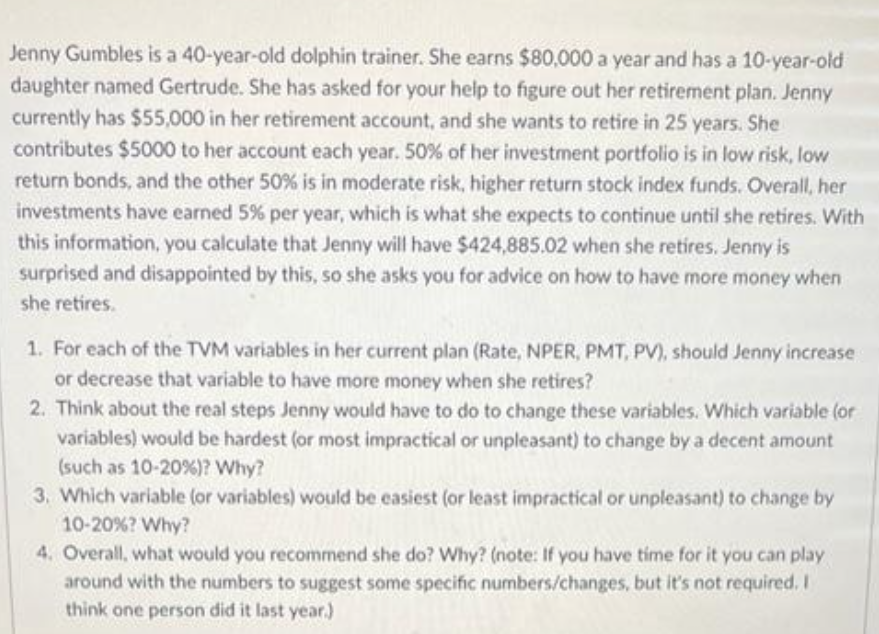She earr a year and has hter named Gertrude. She has asked for your help to figure out her retirement: ently has $55,000 in her retirement account, and she wants to retire in 25 years ributes $5000 to her account each year. 50% of her investment portfolio is in le rn bonds, and the other 50% is in moderate risk, higher return stock index fund stments have earned 5% per year, which is what she expects to continue until s information, you calculate that Jenny will have $424,885.02 when she retires.. prised and disappointed by this, so she asks you for advice on how to have more
She earr a year and has hter named Gertrude. She has asked for your help to figure out her retirement: ently has $55,000 in her retirement account, and she wants to retire in 25 years ributes $5000 to her account each year. 50% of her investment portfolio is in le rn bonds, and the other 50% is in moderate risk, higher return stock index fund stments have earned 5% per year, which is what she expects to continue until s information, you calculate that Jenny will have $424,885.02 when she retires.. prised and disappointed by this, so she asks you for advice on how to have more
Chapter13: Investment Fundamentals
Section: Chapter Questions
Problem 1FPC
Related questions
Question

Transcribed Image Text:Jenny Gumbles is a 40-year-old dolphin trainer. She earns $80,000 a year and has a 10-year-old
daughter named Gertrude. She has asked for your help to figure out her retirement plan. Jenny
currently has $55,000 in her retirement account, and she wants to retire in 25 years. She
contributes $5000 to her account each year. 50% of her investment portfolio is in low risk, low
return bonds, and the other 50% is in moderate risk, higher return stock index funds. Overall, her
investments have earned 5% per year, which is what she expects to continue until she retires. With
this information, you calculate that Jenny will have $424,885.02 when she retires. Jenny is
surprised and disappointed by this, so she asks you for advice on how to have more money when
she retires.
1. For each of the TVM variables in her current plan (Rate, NPER, PMT, PV), should Jenny increase
or decrease that variable to have more money when she retires?
2. Think about the real steps Jenny would have to do to change these variables. Which variable (or
variables) would be hardest (or most impractical or unpleasant) to change by a decent amount
(such as 10-20%)? Why?
3. Which variable (or variables) would be easiest (or least impractical or unpleasant) to change by
10-20%? Why?
4. Overall, what would you recommend she do? Why? (note: If you have time for it you can play
around with the numbers to suggest some specific numbers/changes, but it's not required. I
think one person did it last year.)
Expert Solution
This question has been solved!
Explore an expertly crafted, step-by-step solution for a thorough understanding of key concepts.
Step by step
Solved in 2 steps

Recommended textbooks for you


Pfin (with Mindtap, 1 Term Printed Access Card) (…
Finance
ISBN:
9780357033609
Author:
Randall Billingsley, Lawrence J. Gitman, Michael D. Joehnk
Publisher:
Cengage Learning



Pfin (with Mindtap, 1 Term Printed Access Card) (…
Finance
ISBN:
9780357033609
Author:
Randall Billingsley, Lawrence J. Gitman, Michael D. Joehnk
Publisher:
Cengage Learning



EBK CONTEMPORARY FINANCIAL MANAGEMENT
Finance
ISBN:
9781337514835
Author:
MOYER
Publisher:
CENGAGE LEARNING - CONSIGNMENT

Excel Applications for Accounting Principles
Accounting
ISBN:
9781111581565
Author:
Gaylord N. Smith
Publisher:
Cengage Learning